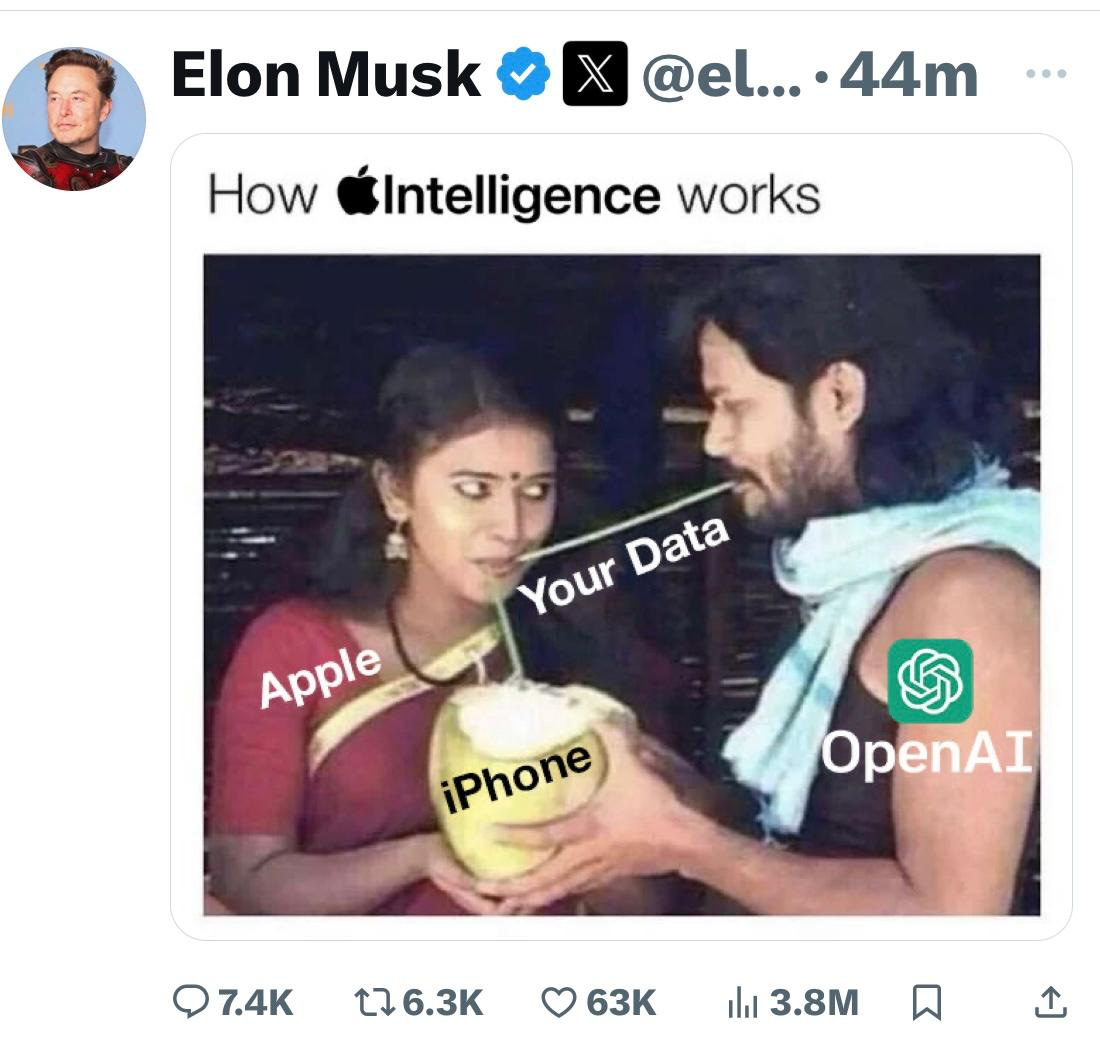Apple's Foray into AI: Concerns About Privacy Allayed by Independent Experts
“Overall, Apple’s approach makes it extremely difficult for anyone, including law enforcement, to access your data without physical access to your device”, Bilawal stated in an exclusive quote to us.

“Apple Intelligence” Unveiled in Partnership with OpenAI
Apple has officially entered the artificial intelligence (AI) arms race by announcing a significant partnership with OpenAI, the creator of ChatGPT. This strategic move was revealed at Apple’s annual Worldwide Developers Conference in Cupertino, California on Monday, 10th June, 2024, marking a pivotal shift for the tech giant, which has largely remained on the AI sidelines until now. This led to a slew of misinformation and disinformation about Apple’s much-touted privacy guardrails and an onslaught by the tech billionaire Elon Musk, resulting in Apple stock closing nearly 2% down by the end of trading on Monday (10th June).
However, our honorary Tech Adviser, Bilwal Sidhu, based in Austin, Texas, issued an analytical tweet underscoring that the concerns were vastly overestimated, if not exaggerated. As we summarise them below for our educated but non-tech audience, it may not be out of place to mention that the Apple stock rallied to close up by 7.26% today (11th June).
In Defense of Apple’s Privacy Measures
Here's a simplified explanation of the privacy features in Apple's recently launched intelligence, as distilled from Bilawal’s public statement:
No Data Retention: Unlike other cloud providers, Apple doesn’t keep your data after processing it. This means there is no stored data that can be accessed or misused later.
No Privileged Access: Even Apple's own engineers (Site Reliability Engineers, SREs) can't access your data. This ensures that even insiders cannot view or misuse your information.
Custom Hardware and Operating System: Apple uses specially designed hardware and software with features like Secure Enclave (a separate chip for encryption) and Secure Boot (ensures only trusted software runs). These measures reduce the risk of attacks.
Non-Targetability: User requests are masked, making it difficult for attackers to identify and target specific data or users. This prevents routing user data to compromised servers.
Verifiable Transparency: Apple allows researchers to inspect their software. This transparency helps verify that Apple’s security promises are met and any issues can be identified and resolved quickly.
“Overall, Apple’s approach makes it extremely difficult for anyone, including law enforcement, to access your data without physical access to your device”, Bilawal stated in an exclusive quote to us This sets a new benchmark for privacy and security in cloud computing, he concluded.

The Announcement
Looping back, Apple unveiled, on Monday (10th June), a series of new AI features and confirmed that ChatGPT technology would be integrated into its products, including iPhones, iPads, and computers, later this year. This integration represents a major validation of OpenAI’s technology and will expose millions of Apple users to ChatGPT’s capabilities, even if they haven’t used it directly before.
Embracing AI Technology
Apple’s leap into AI underscores the broader industry trend towards embracing this transformative technology. Traditionally, Apple has focused on its unique ecosystem, emphasizing user privacy and the seamless integration of its devices. However, the rising tide of generative AI has proven too influential to ignore.
Game-Changing Features
Apple CEO Tim Cook highlighted that the new AI features are “game changers” and will become “indispensable” to Apple’s product lineup. These features, collectively referred to as “Apple Intelligence,” include a text generator for emails and SMS, an image-generating tool integrated into various Apple apps, and a more advanced Siri voice assistant.
Enhanced AI Integration
Apple claims its AI tools are superior because they are deeply integrated into its software. For example, a user can ask their iPhone to “play the podcast my mom texted me,” and the system will intuitively understand and execute the request, leveraging data from various Apple apps.
Competitive Edge
Craig Federighi, Apple’s senior vice president of software engineering, stated, “There are already some really impressive chat tools out there, but these tools know very little about you and your needs.” Apple aims to differentiate its AI tools by offering a more personalized and integrated user experience compared to its competitors.
Regulatory Scrutiny and Partnerships
Apple’s deal with OpenAI could attract regulatory scrutiny. The company is already facing a Justice Department antitrust lawsuit alleging it holds an illegal smartphone monopoly. Regulators are increasingly wary of large tech companies striking deals that could stifle innovation and competition.
Future Collaborations
Federighi hinted at potential AI collaborations with other companies, including Google. “We want to enable users ultimately to bring the model of their choice,” he said, suggesting that Apple may integrate other AI models, such as Google’s Gemini, in the future.
Industry Reactions
The tech industry has been abuzz with AI advancements since OpenAI launched ChatGPT in November 2022. Microsoft and Google have aggressively incorporated AI into their products, with Microsoft investing billions in OpenAI and Google enhancing its search and chatbot capabilities. Apple’s cautious approach initially focused on addressing the ethical and reliability issues of AI, but the company has now embraced the technology.
Safety and Reliability Concerns
Liran Hason, CEO of Aporia, expressed concerns about the rapid deployment of AI technologies, emphasizing the need for essential safeguards to prevent unintended consequences. The fast-paced AI arms race could lead to innovations launched without adequate safety measures, posing risks to both businesses and users.
Elon Musk's Strong Reaction to Apple Intelligence
Elon Musk, a significant figure in the tech industry, has voiced severe criticism against Apple’s new AI integration with OpenAI's ChatGPT, unveiled during the Worldwide Developers Conference 2024. Musk threatened to ban Apple devices from his companies, including Tesla and SpaceX, if Apple implements OpenAI technology at the operating system level, calling it an "unacceptable security violation." He accused Apple of compromising user privacy by handing over data to OpenAI without adequate safeguards and misleading users with their privacy claims. Musk's public statements, including a tweet condemning Apple's actions, highlight his belief that Apple is incapable of developing its own AI technology and is thus endangering user data security.
Market and Privacy Concerns
Musk's sharp criticism underscores broader privacy concerns regarding Apple's new AI features. Despite Apple’s efforts to ensure on-device processing and private cloud computing to safeguard user data, the partnership with OpenAI raises questions about data sharing with third parties. Critics fear that Apple's AI will access deeply personal user data, potentially exposing it to external entities. This controversy, coupled with Musk’s strong condemnation, impacted Apple Inc.'s market performance, with its stock closing almost 2% down on Monday, before rebounding 7.26% on Tuesday. The market’s response reflects the gravity of privacy concerns, which Apple must address to maintain user trust and investor confidence as it prepares to launch these new AI capabilities. Additionally, investors must filter out half-baked information about privacy concerns, especially from billionaires like Elon Musk, who have a clear conflict of interest, having recently raised $6 billion for his own startup, xAI.
Privacy-Focused AI
In line with its commitment to privacy, Apple announced that most AI features would run on devices rather than in the cloud. Complex AI functions will be handled in Apple’s specialized data centers, using its proprietary chips. When leveraging ChatGPT, Apple will notify users before sending requests to OpenAI, ensuring transparency and maintaining user privacy.
Legacy of AI at Apple
Apple has utilized AI technology for years, from image recognition in iPhone photo libraries to emergency alerts on Apple Watches. Siri, Apple’s voice assistant, was an early AI application. However, recent breakthroughs in AI, particularly in large language models developed by Google, have propelled competitors ahead in the AI landscape.
Summing Up—Apple’s Privacy is the Best
Apple’s partnership with OpenAI and the introduction of new AI features signify a bold step forward for the company in the AI domain. By integrating advanced AI capabilities into its ecosystem, Apple aims to offer a more personalized, secure, and efficient user experience, setting a new standard for privacy and innovation in the tech industry. Overall, Apple’s approach makes it extremely difficult for anyone, including law enforcement, to access your data without physical access to your device. Industry experts highlight that this sets a new benchmark for privacy and security in cloud computing, underscoring that Apple's privacy measures are currently among the best in the industry.
If you believe this article would interest someone you know, please feel free to share it anonymously (for us), using any platform that you prefer.




